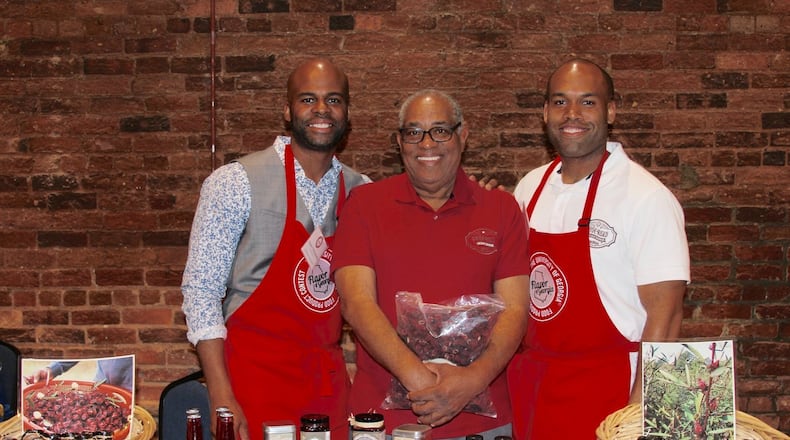We know it as hibiscus, or sorrel. Maybe, roselle. Sometimes, it’s called Jamaica, or even Florida cranberry.
For us, it's a tropical, tangy treat, most often brewed into tea. For the Muhaimin family of Pride Road, hibiscus is the foundation of an expanding line of products. It's a business in which the family is hands-on with every step, from planting the seed and managing the fields, to harvesting and processing the fruit they make into teas, sodas, chutneys and more.
The beautiful dark red calyxes (the sepals of the flower that mature to become the protective layer around the seed pod), which the family harvests, are not from the showy tropical blossoms that are similarly named, but which spend their summers gracing backyard patios. The Muhaimins' plants come instead from Hibiscus sabdariffa, a member of the same family (which includes the plants that give us okra and cotton), grown for its edible, but sour, leaves and succulent calyx.
The Muhaimins did not start out to be food manufacturers, or even farmers. Yasin Muhaimin and his wife Elaine lived in New Orleans, where Muhaimin was a network administrator for the school system. Hurricane Katrina forced their evacuation to Muhaimin’s hometown of Zachary, Louisiana, where they created Yardbird Farms and raised pastured poultry. Talking with researchers at Southern University and A&M College interested them in growing hibiscus as a side project. Elaine began making hibiscus tea, and they sold it at the local farmers market.
Their sons, Yasin and Najeeb, were living in Atlanta. When the brothers tasted their mom’s tea, they saw an opportunity to turn the family hobby into a business. Soon, the parents moved to Atlanta, and Pride Road was born. The name was inspired by Port Hudson Pride Road, the road that ran past Yardbird Farms.
Here in metro Atlanta, the senior Yasin Muhaimin remains the farmer, managing the family’s several growing areas. There’s a small plot in College Park at Metro Atlanta Urban Farm. They farm a larger space in Covington, but this year deer ate those plants down to the ground. And, they farm on 3 acres in Sylvester. It’s a crop that requires six months, from seed to harvest.
What he grows is what the family will process into tea, soda, chutney and jelly.
Once the calyxes start to form, it’s all hands on deck for the harvest. That means family and hired help, too. It’s a daily job, walking the rows and breaking off or clipping the calyxes individually. Then, each calyx is washed, and the hard seed pod at the center is removed. Muhaimin engineered his own tool to core each calyx, arguably the most tedious part of the process.
The calyxes go to the family’s commercial kitchen in downtown Lithonia. Within 48 hours, it all will be either dried or frozen to use for production later in the year. The space is a former floral shop, and its spacious interior provides lots of storage, and room for the dehydrators, jelly makers, kettles and packaging equipment needed for their range of products.
The current best-seller is their hibiscus tea with ginger and citrus. The recipe was Elaine’s, but it was tweaked by Najeeb’s wife, Millie, to include a touch of rosewater. The result is refreshing, and light enough to be drinkable over and over. Later in the season, chutney and jelly will be a major focus of production, as their customers prepare for holiday meals.
The family uses every part of the hibiscus they grow. Dried hibiscus leaves are part of the infusion that makes the tea. Calyxes that have been steeped for tea are strained out and saved to be used to make chutney. The seed pods are dried and saved to provide the seed stock for next year’s crop. It’s a sustainable business that produces little waste.
“My brother and I have full-time jobs, and since my parents are retired, they do the majority of the work,” said the younger son, Yasin. “But, we come in on the weekends, or even take a day off when we have a big wholesale order. We pride ourselves on the freshness of our products. We don’t have a big backlog of inventory. When an order comes in, we make the product to fill it.”
RELATED:
Read more stories like this by liking Atlanta Restaurant Scene on Facebook, following @ATLDiningNews on Twitter and @ajcdining on Instagram.
About the Author
Keep Reading
The Latest
Featured




